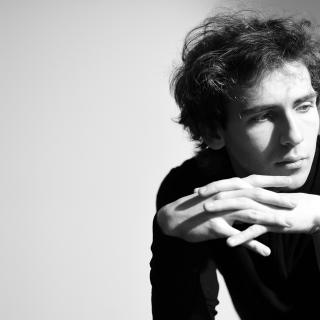Helvi Leiviskä's symphonies were born from her experiences of a holistic vision, a visual revelation. “In fact, my musical pursuit and my search for eternal values are quite indistinguishable.” Leiviskä considered her Sinfonia brevis, which she completed in 1962, to be her fourth symphony.
“A fire-breathing virtuoso!” (Gramophone), “Liszt reincarnate!” (Fanfare), “Young tsar of the piano” (Classica). Music magazines around the world have used superlative metaphors to describe this evening’s piano soloist.
Dalia Stasevska
Born in Ukraine but resident in Finland since she was five, Dalia Stasevska (b. 1984) has become known above all for her adventurous, thought-provoking and unconventional programming often combining works from different eras and genres. Her interests are many: music both classical and light, opera, pop, modern art, architecture and design, and she says her curiosity may be equally aroused by, say, 1960s Italian architecture or Finnish kitchenware design.
Dreams of a career as a violinist gave way to conducting when Dalia attended a course given by Finland’s Grand Old Man conductor-professor Jorma Panula, and over the past few years she has become one of Finland’s most visible conductors on the international scene. The present season alone includes a host of USA debuts and a Glyndebourne production of Britten’s Midsummer Night’s Dream. Dalia Stasevska is Principal Guest Conductor of the BBC Symphony Orchestra and Chief Conductor of the Lahti Symphony Orchestra.
Alexandre Kantorow
Alexandre Kantorow (b. 1997) has shot to fame in recent years following his outstanding victory in the Moscow Tchaikovsky Competition in 2019 – the first French pianist to achieve this in the competition’s history. As a child he was not particularly interested in music, despite being the son of a violinist mother and a violinist-conductor father. Not until he entered the Schola Cantorum in Paris was he really smitten, and soon made up for ‘lost’ time. He likes playing less-frequently-performed works by well-known composers. In the Moscow competition, he was the only finalist to choose Tchaikovsky’s second piano concerto. He has recorded all the Saint-Saëns piano concertos and this season plays Rachmaninov One with both the HPO and the Belgian National Orchestra.
Still only in his mid-twenties, Kantorow has already appeared with dozens of great orchestras and won two Diapason d’Or disc awards. He makes his HPO debut today but has been heard several times in Finland with the Tapiola Sinfonietta and at the Mikkeli Music Festival.
Helvi Leiviskä: Sinfonia brevis
Helvi Leiviskä (1902-1982) spent most of her working life – 35 years – as the Sibelius Academy librarian. She also studied composition with Erkki Melartin, in Vienna and privately with Leevi Madetoja, and is best remembered for her large-scale works: three symphonies, a piano concerto and the concise Sinfonia brevis. The majority of her works reflect her liking for contrapuntal forms, resulting in her ultimate rejection of National-Romantic elements. Over the years, her idiom became increasingly atonal and polyphonic and in her late works came close to expressionism. The Sinfonia brevis of 1962/1972 marked the culmination of her output, with its great triple fugue in the closing movement.
Three concerts of Leiviskä’s works were given during her lifetime and they generally evoked positive reviews, though one Finnish composer-critic did suggest that her music may be perhaps a little too highbrow for players and listeners at the time.
Sergei Rachmaninov: Piano Concerto No. 1 in F-sharp Minor, Op. 1
The fact that he was a Russian born in Russia inevitably influenced his character and his music, said Sergei Rachmaninov (1873–1943), yet he never tried to write deliberately nationalist music. On the contrary, he tended to distance himself from the latest trends – impressionism and expressionism – and stuck to the dominant 19th-century pan-European style, romanticism.
In 1900, Rachmaninov was only 17 when he wrote the opening movement of his first piano concerto, and only 18 when he finished the other two. In a letter dated 1917 he told a friend that he had rewritten it. “It is really good now. All the youthful freshness is there, and yet it plays itself so much more easily. And nobody pays any attention. When I tell them in America that I will play the First Concerto, they do not protest, but I can see by their faces that they would prefer the Second or Third.” His revisions of 1917 applied particularly to the points he felt were too like the popular Grieg concerto, but he also covered the first and last movements with red pen. The big cadenza in the first movement is the core of the whole concerto.
Jean Sibelius: Symphony No. 6 in D Minor, Op. 104
Jean Sibelius (1865–1957) had long been familiar with the archaic sung poetry of his native Finland when he began sketching his fifth symphony. Its influence on his music was, however, reflected only indirectly, and mainly in the superficial hints of the ancient modes. By contrast, the process of continuous thematic mutation he developed in his symphonies had direct points of contact with the way the singers he had heard varied and modified their melodies. Some of the motifs originally intended for the fifth later found their way into the sixth and seventh symphonies. Sibelius did not begin working in earnest on the sixth until 1922, and from then onwards all went smoothly. The premiere in Helsinki in 1923 got a varied reception, though some critics at least were quick to spot the symphony’s greatness.
The sixth symphony is a sovereign representative of Sibelius’s late style. Describing it in his diary, he said, “The shadows grow longer.” Rich in polyphony, the symphony is classically balanced, full of shifting sunlight and shadow, and according to some non-Finnish scholars shows Sibelius at his most Sibelian.

